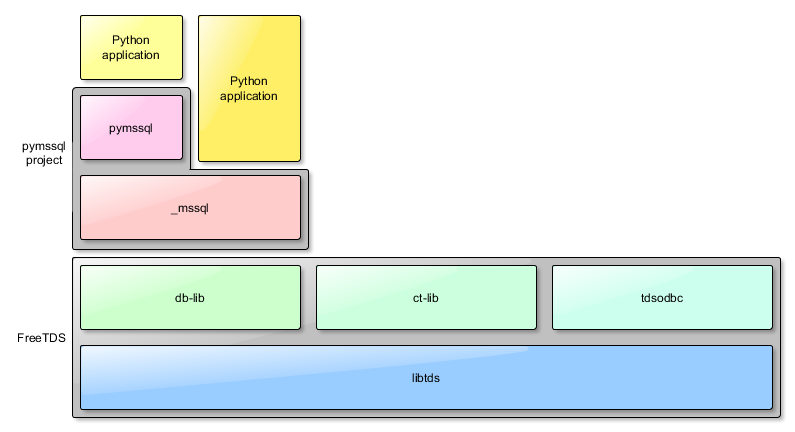Introduction¶
Getting started¶
Generally, you will want to install pymssql with:
pip install pymssql
Most of the times this should be all what’s needed.
Linux
First make sure you are using pip version 8.1.0 or newer so you can take advantage of its support for PEP 513 Linux manylinux1 binary Wheel packages. Starting with pymssql version 2.1.3 we provide such wheel packages that bundle a static copy of FreeTDS so no additional dependency download or compilation steps are necessary.
Then run:
pip install pymssql
it will fetch the package from the Python Package Index (PyPI) and install it.
Note
The statically-linked FreeTDS version bundled with our official pymssql Linux Wheel package doesn’t have SSL support so it can’t be used to connect to Azure. Also it doesn’t have Kerberos support so it can’t be used to perform domain logins to SQL Server.
Mac OS X
(with Homebrew):
Run:
brew install freetds pip install pymssql
it will fetch the source distribution from the Python Package Index (PyPI), build and install pymssql.
Windows
First make sure you are using pip version 6.0 or newer so you can take advantage of its support for Windows binary Wheel packages. Starting with pymssql version 2.1.3 we provide such wheel packages that bundle a static copy of FreeTDS so no additional download or compilation steps are necessary.
Then run:
pip install pymssql
it will fetch the package from the Python Package Index (PyPI) and install it.
Note
The statically-linked FreeTDS version bundled with our official pymssql Windows Wheel package doesn’t have SSL support so it can’t be used to connect to Azure.
See Installation and FreeTDS for more advanced scenarios.
Docker
(Experimental)
Another possible way to get started quickly with pymssql is to use a Docker image.
Architecture¶

The pymssql package consists of two modules:
pymssql– use it if you care about DB-API compliance, or if you are accustomed to DB-API syntax,_mssql– use it if you care about performance and ease of use (_mssqlmodule is easier to use thanpymssql).
And, as of version 2.1.x it uses the services of the db-lib component of
FreeTDS. See the relevant FreeTDS documentation for additional details.
Install¶
Remember to install FreeTDS first.
pip¶
pip install pymssql
will install pymssql from PyPI. This PyPI page contains:
- source distribution (
.tar.gz) - wheels (
.whl) for Windows
FreeTDS is required. On some platforms, we provide
a pre-compiled FreeTDS to make installing easier, but you may want to install
FreeTDS before doing pip install pymssql if you run into problems or need
features or bug fixes in a newer version of FreeTDS. You can build FreeTDS
from source if you want the
latest. If you’re okay with the latest version that your package manager
provides, then you can use your package manager of choice to install FreeTDS.
E.g.:
Ubuntu/Debian:
sudo apt-get install freetds-dev
Mac OS X with Homebrew:
brew install freetds
Project Discussion¶
Discussions and support take place on pymssql mailing list here: http://groups.google.com/group/pymssql, you can participate via web, e-mail or read-only subscribing to the mailing list feeds.
This is the best place to get help, please feel free to drop by and ask a question.
Project Status¶
Current release: 2.x is the branch under current development. It is a complete rewrite using Cython and the latest FreeTDS libraries (which remove many of the limitations of previous versions of FreeTDS).
Legacy release: 1.0.3 is the legacy version and is no longer under active development.
Note
This documentation is for pymssql 2.x.
The document set you are reading describes exclusively the code base of pymssql 2.x and newer. All description of functionality, workarounds, limitations, dependencies, etc. of older revisions has been removed.
If you need help for building/using pymssql 1.x please refer to the old Google Code documentation Wiki.
Current Development¶
Official development repositories and issue trackers have been moved to GitHub at https://github.com/pymssql/pymssql.
We would be happy to have:
- A couple more developers
- Help from the community with maintenance of this documentation.
If interested, please connect with us on the mailing list.